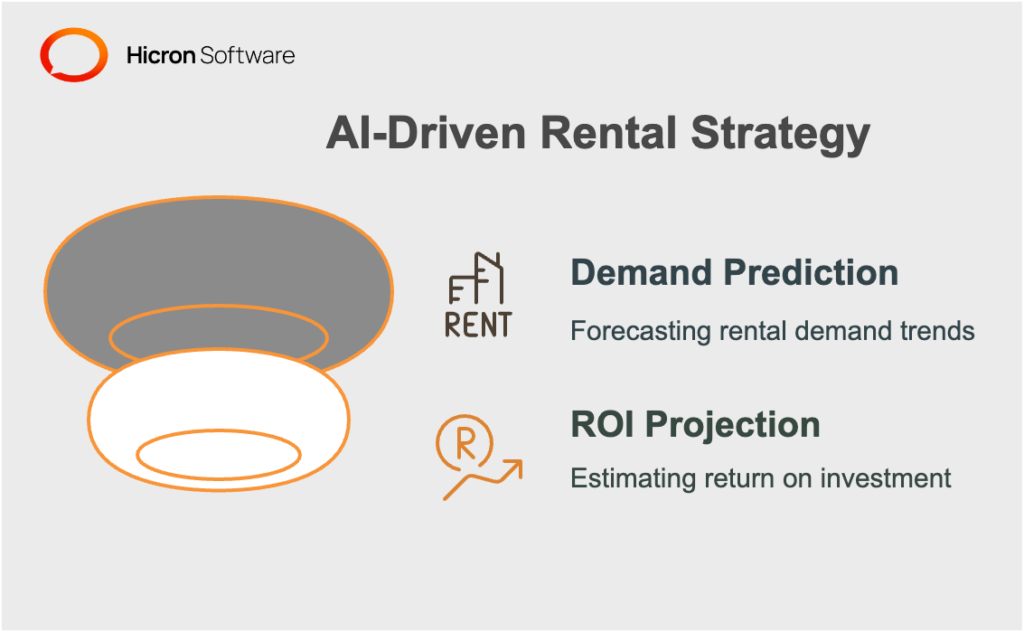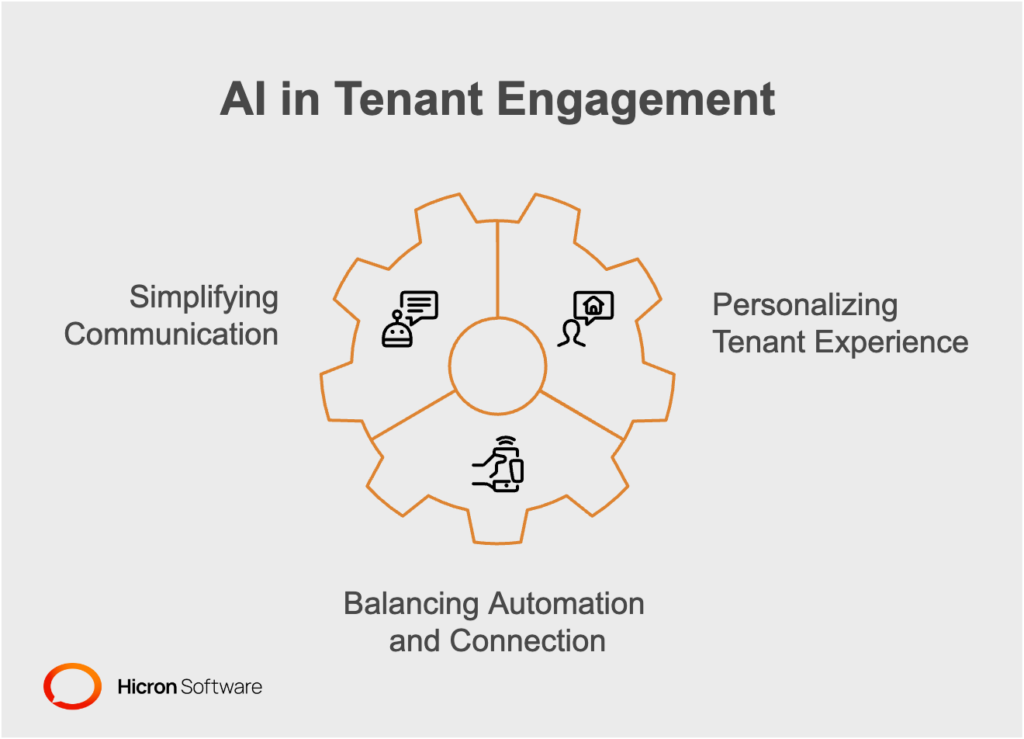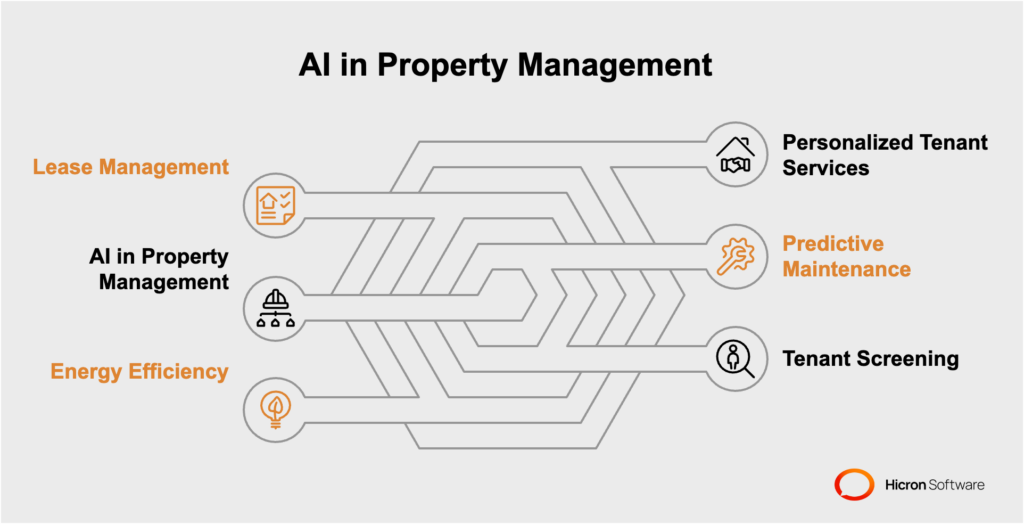Exploring PropTech: Key Technologies & Software Solutions Transforming Real Estate
- December 09
- 12 min

AI in property investment. From streamlining property valuation to improving risk assessment, AI-driven PropTech software are empowering investors with data-driven insights and automation. With the ability to analyze complex datasets, AI helps predict trends, identify opportunities, and mitigate risks. This article explores how AI revolutionizes property investment, focusing on rental demand forecasting, ROI prediction, and enhancing tenant engagement with chatbots and virtual assistants.
For years, property valuation relied on subjective appraisals. Now, AI in real estate leverages machine learning to analyze a wealth of factors; historical sales data, neighborhood trends, and amenities; to deliver accurate, unbiased valuations. AI-powered property valuation software processes large datasets quickly, helping investors make well-informed decisions.
Investment success depends on mitigating risk, and this is where AI truly shines. Through predictive analytics for property trends, AI reveals potential threats like market volatility, environmental hazards, and regulatory changes. It provides a comprehensive risk profile by integrating financial risk modeling with real estate factors.
While AI offers immense potential, its effectiveness hinges on the quality and availability of data. Human oversight remains critical to interpret insights and account for variables that numbers alone can’t capture.
AI algorithms dissect vast datasets to predict rental demand. PropTech tools analyze population shifts, economic trends, and infrastructure developments, and they forecast market needs with remarkable accuracy. Additionally, AI rental demand analytics uses natural language processing (NLP) to monitor online activity, such as social media chatter and search patterns, providing insights into emerging rental demands.
Investors look to AI for precision in ROI analysis. By factoring in property-specific elements like maintenance expenses and historical rental income, AI tools create tailored ROI projections. This ensures every decision is grounded in actionable data.

AI also identifies emerging rental markets. Heatmaps and property scoring systems highlight growth hotspots, helping investors seize high-potential opportunities before the competition. However, concerns about the “black box” nature of some AI tools and biases in data sets emphasize the need for transparency and scrutiny.

AI-powered chatbots revolutionize tenant interactions by handling inquiries about listings, lease terms, and maintenance requests. These intelligent chatbots for rentals send timely reminders and ensure seamless communication, improving tenant satisfaction while saving property managers time.
Virtual assistants go a step further by learning about tenant preferences and tailoring responses. For example, they can suggest properties aligned with tenant needs or streamline lease onboarding through automated document verification. This adds a layer of personalization that enhances tenant retention.
While AI simplifies property management, maintaining a human touch is vital. Additionally, addressing tenant privacy concerns is crucial when sensitive data is handled by cloud-based AI platforms. Striking the right balance between automation and personal connection is key to successful implementation.
Artificial Intelligence (AI) is revolutionizing property management by introducing smart, automated solutions that address traditional challenges and unlock new opportunities for efficiency and growth. Here’s how AI is transforming various aspects of the property management sector:
One of the standout applications of AI in property management is predictive maintenance. AI-powered systems use data from IoT sensors installed in buildings to monitor equipment, plumbing, HVAC systems, and other key assets. These systems analyze patterns to predict when maintenance might be required, often identifying issues before they escalate. For instance, AI can detect unusual vibrations in an elevator or irregularities in energy usage, signaling a need for intervention. By tackling problems proactively, property owners minimize costly repairs, reduce downtime, and extend the lifespan of their assets; all while avoiding disruptions for tenants.
AI streamlines tenant screening processes by analyzing applications more thoroughly and objectively. Traditional methods often relied on manual reviews of credit scores, rental history, and employment details, leaving room for bias or oversight. AI tools, on the other hand, assess applicants based on multiple factors such as payment histories, behavioral patterns, and even public data. By providing fair and data-driven evaluations, these tools help property managers find reliable tenants quickly, reducing vacancy rates and avoiding future evictions. Additionally, automation significantly speeds up the application process, creating a more applicant-friendly experience.
Managing leases often involves juggling renewal dates, compliance requirements, and legal agreements. AI platforms simplify lease management by automating time-consuming tasks such as generating customized lease documents, tracking expiration dates, and sending automated renewal reminders. Some advanced systems can even flag clauses in agreements that need updating due to regulatory changes. This automation saves time and reduces the likelihood of costly errors, such as missing deadlines or failing to comply with changing regulations.
Sustainability is becoming increasingly important in property management, and AI is proving to be a game-changer in energy efficiency. Smart energy management systems powered by AI monitor building energy usage and optimize operations to reduce waste. For example, AI can adjust heating and cooling systems based on real-time weather data or usage patterns, ensuring energy is only consumed when needed. Tools like these have already been shown to cut energy costs by significant margins, reduce the carbon footprint of properties, and enhance compliance with green building standards. Some systems even provide actionable insights, helping property managers make informed decisions about energy upgrades.
Fostering tenant satisfaction is a key goal of property management, and AI excels at providing personalized tenant services. AI-driven chatbots are available 24/7 to answer tenant inquiries, handle maintenance requests, and provide updates on property events. Beyond chatbots, virtual assistants powered by machine learning can analyze tenant preferences to tailor recommendations for amenities or streamline processes such as lease renewal or parking allocations. By offering a seamless, user-friendly experience, property managers not only improve tenant relationships but also increase retention rates.

Practical Benefits
The integration of AI into property management delivers several tangible benefits. First and foremost, these tools facilitate cost savings by optimizing operations, reducing resource wastage, and minimizing repair costs. Secondly, AI enhances tenant satisfaction through faster communication, better services, and property environments that cater to individual needs. Finally, AI tools boost operational efficiency, allowing property managers to focus on strategic decisions rather than getting bogged down in routine administrative tasks.
From predictive algorithms that cut maintenance costs to chatbots that offer personalized tenant experiences, AI’s practical impact on property management cannot be overstated. By harnessing these technologies, property managers can create smarter, safer, and more sustainable buildings while enhancing the overall tenant experience. As AI continues to advance, its adoption in property management is likely to expand, setting new standards for efficiency and innovation.
In an era marked by rapid change and rising expectations, real estate software development advisory plays a pivotal role in guiding real estate and property management professionals through technological transformation. Success in applying AI and other advanced solutions requires more than just technical skills; it demands deep domain knowledge of the real estate market and property management nuances.
The scope of AI in property investment is expanding rapidly. For instance, smart contracts powered by AI and blockchain are transforming property transactions, offering seamless and secure processes. Additionally, AI is gaining prominence in sustainable property investments, where it helps predict the ROI of eco-friendly properties and optimizes energy-efficient operations.
Experienced developers who understand the industry’s challenges, trends, and regulatory demands can craft solutions that address specific needs while ensuring scalability and usability. By merging industry expertise with proficiency in modern technologies like AI, machine learning, and automation, developers empower real estate professionals to adapt, innovate, and stay competitive. This alignment of technology with practical, sector-specific insights ensures that new tools are not only cutting-edge but also effective in solving real world problems.
Looking ahead, AI’s role in risk assessment, ROI optimization, and tenant management will continue to grow. Early adopters who leverage these technologies can stay ahead of the curve and maximize their investment potential.
AI has brought a revolution to property investment. Its ability to automate complex tasks, deliver precise insights, and forecast trends is changing how investors approach their portfolios. Whether it’s improving property valuation, predicting rental demand, or personalizing tenant relations with virtual assistants, AI-enabled solutions are proving invaluable.
To gain a competitive edge in today’s market, real estate investors must harness these tools and foster innovation. By combining tech-driven strategies with human expertise, property investors can turn calculated risks into rewarding opportunities; a winning formula for long-term success.
AI leverages machine learning to analyze historical sales data, neighborhood trends, and amenities, providing unbiased and precise property valuations compared to traditional methods.
AI algorithms analyze population shifts, economic trends, and online activity to forecast rental demand, helping investors identify high-potential markets and opportunities.
AI-powered chatbots and virtual assistants streamline communication by handling inquiries, sending reminders, and personalizing tenant experiences, improving satisfaction and retention.
AI uses predictive analytics to identify potential risks like market volatility, environmental hazards, and regulatory changes, enabling investors to make informed decisions.
AI-powered systems optimize energy usage by analyzing real-time data, adjusting operations like heating and cooling, and reducing waste, leading to cost savings and sustainability.
